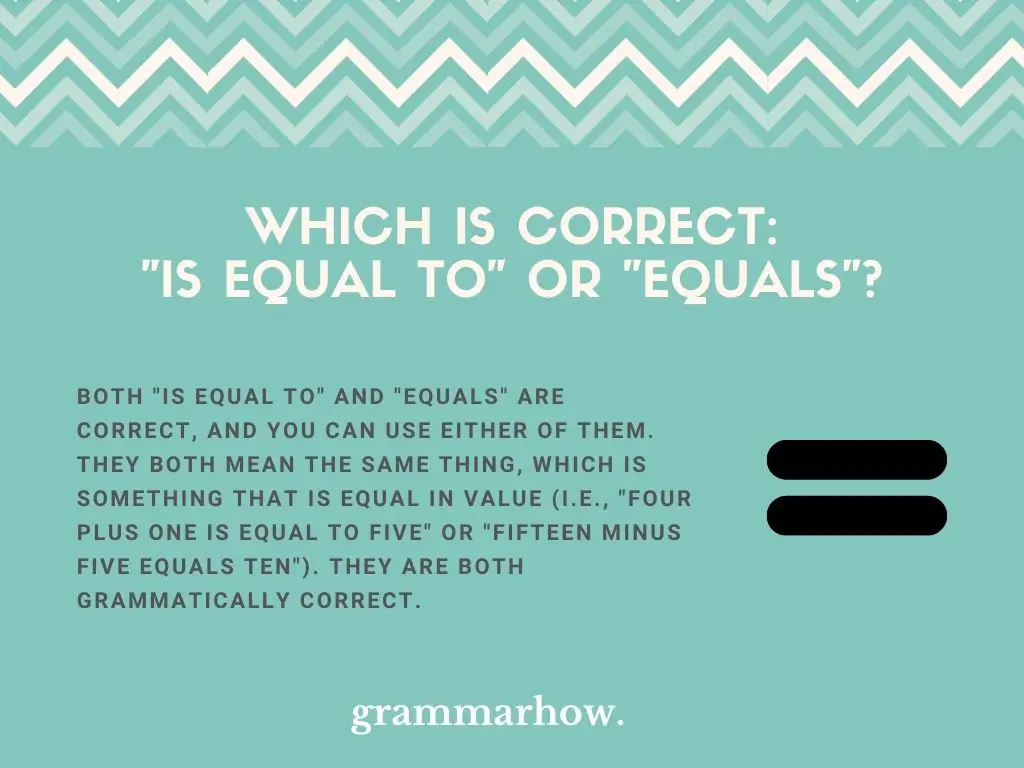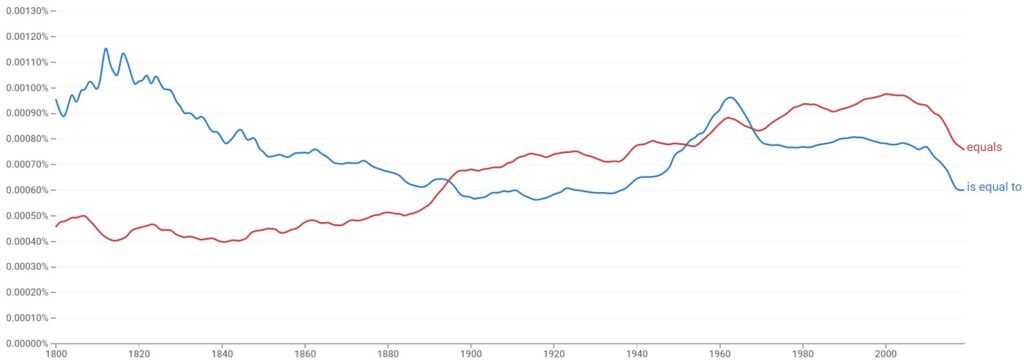The phrases “is equal to” and “equals” are common in English, especially when talking about mathematical equations. However, is there a correct version that we should be using, or are both phrases good to use? This article will explore which is best.
Which Is Correct: “Is Equal To” Or “Equals”?
Both “is equal to” and “equals” are correct, and you can use either of them. They both mean the same thing, which is something that is equal in value (i.e., “four plus one is equal to five” or “fifteen minus five equals ten”). They are both grammatically correct.

What Does “Is Equal To” And “Equals” Mean?
“Is equal to” and “equals” mean that something is the same value as the thing that was previously stated. We mostly use it in mathematical senses, though it can also refer to physical things being equal in something like weight, age, or height.
The definition of “equal,” according to The Cambridge Dictionary, is “to be the same in value or amount as something else.”
Both phrases mean the same thing, and “equal” is used as a verb in both of them.
Is “Equals” Or “Is Equal To” Used The Most?
Usually, with synonymous phrases like this, you’ll find that one is more popular than the other. This typically helps us to focus our learning on one over the other. However, with “equals” and “is equal to,” this isn’t the case.
According to this graph, both phrases are almost identical in popularity. “Equals” is slightly more popular and has been for the last few decades, but “is equal to” is also a fairly popular choice.

It mostly comes down to personal preference which one you prefer to use. Some people believe “equals” to be the informal choice and “is equal to” to be more formal, though not a confirmed fact.
Incidentally, the popularity of “equals” and “is equal to” is almost equal to each other, which is something of poetic irony, if you think about it.
Examples Of How To Use “Is Equal To” In A Sentence
Let’s go over using the two phrases in examples. We’ll start with “is equal to,” which is slightly less popular.
- The weight of this horse is equal to the weight of this cow.
- How much of this pizza is equal to the calories in a yogurt?
- Fourteen plus two is equal to sixteen.
- What is this equal to? I can’t find the answer anywhere.
- This is equal to that, though I can’t see why you would need to know that.
- The weight of this sugar is equal to our new puppy, though I doubt it’ll stay that way for long.
Examples Of How To Use “Equals” In A Sentence
“Equals” is the more popular choice, though it means the same thing.
- What did you say this equals again?
- That equals fifteen dollars; how would you like to pay?
- Four times four equals sixteen.
- If you didn’t know, this equals four times the amount you’re willing to spend, so let’s leave.
- The bill equals thirty-three dollars plus tip.
- I can’t figure out what this equals!
Should I Use “Equal” Instead Of “Equals”?
You should use “equals” when you want to talk about two things that we compared with each other. This extends to things outside of mathematical equations. You should only use “equal” when asking a question about what something “equals” in the singular.
- That equals about thirteen dollars more than this one.
- What does this equal?
Is It Ever Correct To Use “Is Equals To”?
“Is equals to” is never correct. We cannot use the verb tense “equals” with “is” and “to” on either side of it. You should only use “equals” or “is equal to.”
- Correct: This is equal to the cost of how many fried egg sandwiches?
- Incorrect: The bill is equals to sixteen fifty.
When Should I Use “Is Equal To” Vs. “Are Equal To”?
When using the singular form, you should use “is equal to.” We use it when we’re only talking about one object that equals something else. You should use “are equal to” when comparing two or more things and using the plural form.
- This egg is equal to fifty cents, right?
- These three things are equal to how much? I wasn’t listening.
Can I Use “Is Equal” Instead Of “Is Equal To”?
You should not use “is equal” instead of “is equal to.” It is not grammatically correct to do so. However, some people do use “is equal” in a colloquial sense and only do so in spoken English.
It’s best if you practice good English and make sure you always use grammatically correct words and phrases. Even if some native speakers say “is equal” casually, you should stick to using “is equal to.”
- Correct: Three of these are equal to two of those.
- Incorrect: Five plus five is equal ten.
Which Is Correct: “Equal To” Or “Equals To”?
“Equal to” and “equals to” are not correct unless we use “is” beforehand. We can never use either phrase without “is.” However, when “is” is included, only “is equal to” is correct, and we should not use “is equals to.”
Does “Same” Mean “Equal”?
Finally, let’s look at the meaning of “same” and “equal.” Many people get these confused, and for a good reason. They’re fairly similar words, and you can use them in much the same way, but they’re not identical.
“Same” means that two or more things are the same as each other, meaning that there are no differences. “Equal” means that two or more things total another value and equal that value because of their combined total.
Generally, “equal” is best when using a mathematical equation or sum of some kind:
- This is equal to thirteen of those.
- Five times five equals twenty-five.
However, “same” isn’t a verb, and we also don’t use it when talking about mathematical equations. Instead, we stick to using it when two things are the equivalent value.
- Three and five are the same numbers if you think about it.
- The value of this bill is the same as the value of the bill across the way.

Martin holds a Master’s degree in Finance and International Business. He has six years of experience in professional communication with clients, executives, and colleagues. Furthermore, he has teaching experience from Aarhus University. Martin has been featured as an expert in communication and teaching on Forbes and Shopify. Read more about Martin here.
